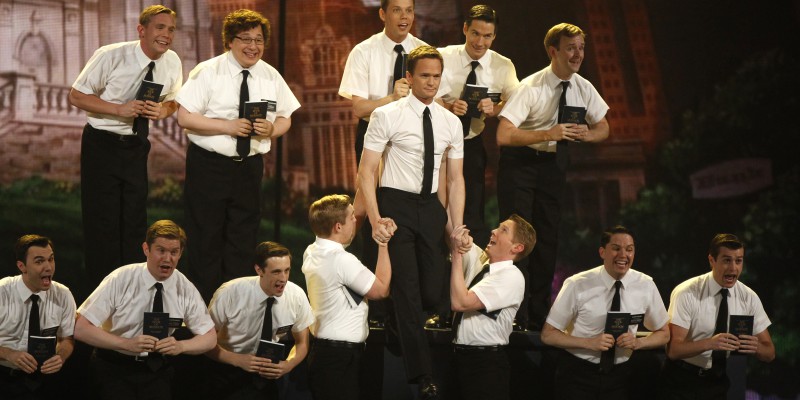The Mormons reacted brilliantly to the musical satirising their faith, but something important is lost when we treat religions so differently – writes Katie Engelhart.

Imagine a musical satire of Muslims—complete with a razzle dazzle reenactment of Muhammad’s revelation, dancers twirling Qur’an, and young Muslim boys singing about how best to convert the heathen masses. It could be called: The Book of Islam.
In March 2013, ‘The Book of Mormon’ premiered in London. The musical—from South Park creators Trey Parker and Matt Stone—was a big hit, taking in more than £2 million in a single day. The plot of the show is essentially as described above; just substitute Muslims, Muhammad and Qur’an with Mormons, Joseph Smith and Book of Mormon.
I saw the show. It was hilarious. I laughed a lot—and unapologetically. But even while guffawing, I was aware of an obvious truth: that ‘The Book of Islam,’ as I have invented it, will never be a West End smash. It will never be produced; there’s not a chance. This raises the question: why, in practice, are we free to satirise some religions and not others? What makes Mormons so funny?
At Free Speech Debate, we talk a lot about offence—whether our legal right to offend should be tempered by calls for respect and civility. Last year, our director Timothy Garton Ash interviewed Mark Thompson, then director general of the BBC, about his network’s decision to broadcast ‘Jerry Springer: The Opera’—a musical that features an effete Jesus dressed in a diaper. The broadcast was protested vehemently by Christian groups. In our interview, Thompson insisted that the opera was “a serious piece of artistic work.”
So Garton Ash pressed the issue further. Would the BBC have broadcast the same scene, substituting Muhammad for Jesus? Thompson’s pallid answer: probably not. Islam is “almost entirely a religion practiced by people who may already feel in other ways isolated, prejudiced against,” Thompson argued. In other words, we should not kick a dog that is already down.
Perhaps we feel less guilty taunting Mormons. It’s true; the Church of Jesus Christ of Latter Day Saints (LDS) has its own bloody, persecution-studded history. But Mormonism is now the fastest growing religion in America. Its earnest teenage proselytisers are viewed with affection—or, at worst, lukewarm wariness. The faith has been normalised in the eyes of many. (The proof in the pudding: Mitt Romney.) Perhaps because Mormons are successful, they have become acceptable targets of humour? We feel that they can take it. Our guilt is assuaged.
Another part of this surely has to do with scripture—and how different faiths define blasphemy. Many Muslims consider it blasphemous to depict the Prophet Muhammad. But Malcolm Adcock, public affairs director for the Mormon LDS Church in Britain, told me that “there is nothing in Mormon teaching that would prevent the depiction of a prophet.” A crack at Mormon prophet Joseph Smith is a slight. A depiction of Muhammad is an offence of grave proportions.
Then there is the issue of the joke’s reception. Generally speaking, lives aren’t lost when Mormonism is defamed. But that does not hold true when Islam is the butt of the joke. In fact, the Mormon church’s response to the musical was pretty cool. LDS issued a subdued, one-sentence statement on its website. Then it took out advertisements in theatre playbills and in London Underground stations —effectively milking the free publicity that the show offered.
But how should we deal with humour when the targets aren’t laughing?
The issue of blasphemy is a particularly difficult one. Functioning societies require some measure of restraint and decorum. But the argument that we shouldn’t, say, depict Muhammad because it is against Islamic teachings seems weak. After all, broadly applied, that means asking everyone to respect the religious scriptures of all other religions. Apart from being a logistical and theological nightmare, this principle violates our right not to believe. Furthermore, if our opinion happens to be that these scriptures are unfounded and unjust, being forced to respect them for the sake of civility would feel stifling.
And still, Hollywood cedes to this pressure. Take the example of South Park. Comedy Central has censored episodes of the show that depict the Prophet Muhammad in a bear costume. In the wake of the Danish cartoons controversy, the risk seems too great. Self-censorship rules the day. In 2005, the network pulled a South Park episode making fun of Scientology. The threat here was probably that of a crushing lawsuit, rather than street violence. But the effect was the same.
It isn’t just Hollywood that has double standards. Hillary Clinton, for instance, went to see The Book of Mormon. Around the same time, she called the controversial Innocence of Muslims film “disgusting and reprehensible.” Buoyed by this sentiment, the US federal government called on Google to take the film down from YouTube. In the words of Wall Street Journal columnist Brett Stephens, the moral of the story is “that it’s okay to concede the fundamentalist premise that religious belief ought to be entitled to the highest possible degree of social deference—except when Mormons and sundry Christian rubes are concerned.”
Is free speech—in the form of joke-telling—cheapened when it is applied with such discretion?
For now, those straight-laced, cuddly Mormon missionaries are left to bear the brunt of our laughter. And they’re doing it ever so nicely.
Katie Engelhart is a freelance journalist in London. Previously she studied Modern History at St. Antony’s College, Oxford.
16 May 2013






















